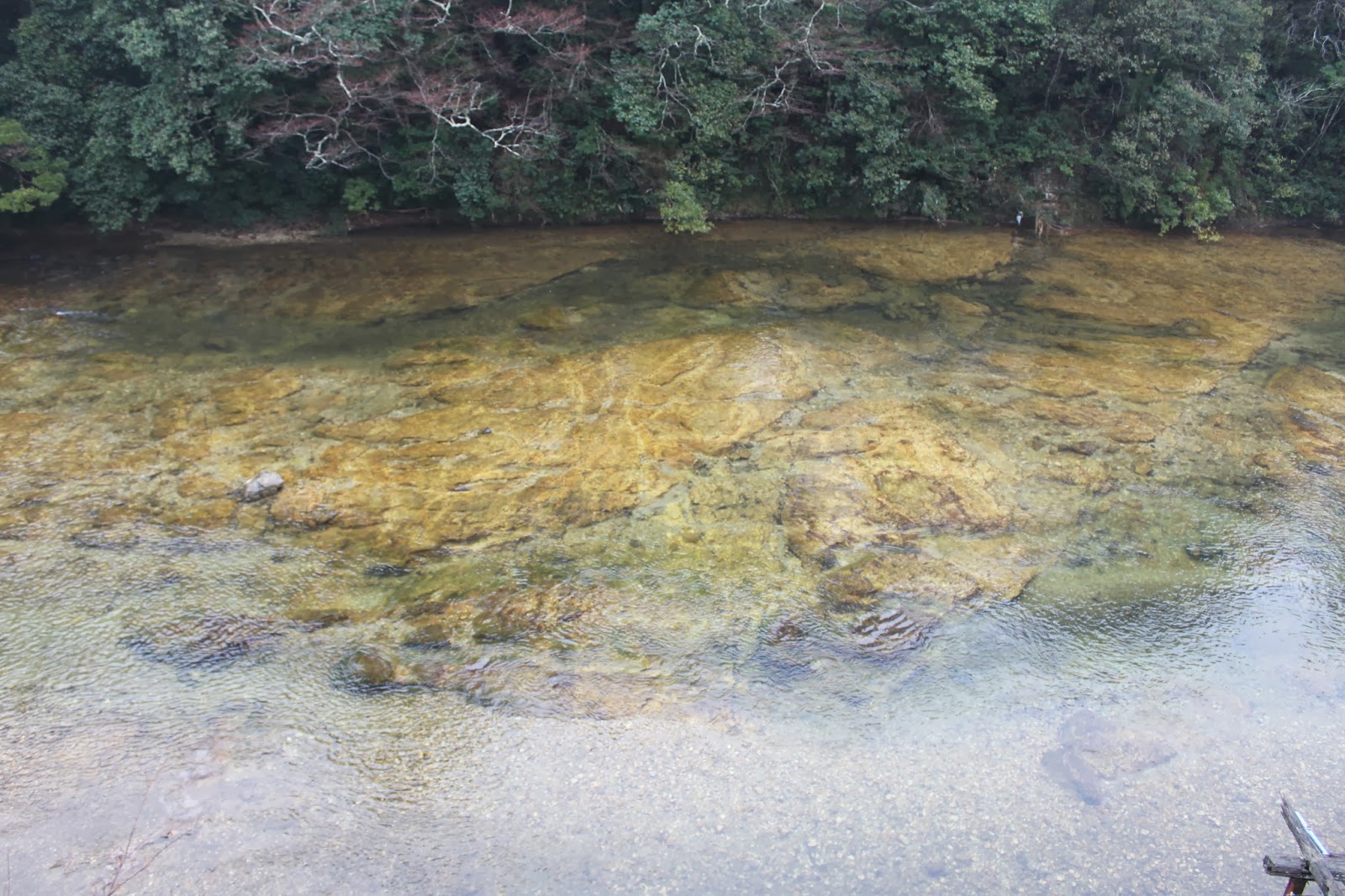This morning I was sitting by a river watching the tombi gather in the trees on the other bank. The sun wasn't up as it was no more than 7.30 am and the fact I was naked didn't really matter in the chill of an early February dawn because I was sat in a bubbling hot onsen bath. In such moments, when travelling in Japan, my attachment to my own culture and place of origin is ephemeral at best. Deep in the mountain fastness of Aichi prefecture, where whole communities live within the ancient ways of rivers carved between mountains, in places where the horizon is a cliff pinned into place by trees growing on impossible precipice, there it is possible to loose everything but the moment.
Wrapped in the warmth of the mountain's tears, held close against the cold by the volcanic springs, beyond this heated sanctuary the crisp coldness of the day unfolds and all the filth of western life is sluiced from your soul. Below the golden river flows and sparkles in the imagination with the fresh, clean thoughts that mountain waters inspire. I sat with my memories of the night before, I sat alone in that morning haze but surrounded by friends newly met.
Here is a heartland in which the blood of Japan flows, an ancient landscape overlain with the human history of a culture which inhales it's past with every breath. This is the land where Oda Nobunaga came and forged the foundations from which the Tokagowa Shogunate would ultimately emerge. Ieyasu was conceived in these mountains by parents attending the holy mountain looking to be blessed with a male heir. I sat in my onsen bath but didn't have to wait for the bird to sing because the tombi were screeing to each other in the trees opposite.
To know Japan, I mean to know Japan as a foreigner, you have to do more than spend time in this place. Listen to the words, "to spend" time. There is the issue, as though you could spend, as though time is a currency, as though time has a value which can be bought in dollars or sterling. Here is our crime within our own common usage of language. Here is the corruption of value through the endless commodification of existence for the purpose of corporate profits. If we buy Japan we sell humanity.
Pressure is coming to bear on this precious cultural soul. A British politician recently called for the Japanese to cease their protectionism and open their economy to international business. Amusing isn't it, a bought and paid for agent for corporate interest masquerading as a democratic representative in a country sold, lock, stock and barrel, to corporate interest, almost demanding on the surrender of "being Japanese" so that this country can be raped like we have been.
If you are British then you will understand why the word "raped" is actually applicable. You understand it when you pay your energy bills, you understand it when you look for customer service from your media suppliers, your banks or your welfare system. You understand it whenever you try to place your consumer rights before the interests of shareholder profits. In the UK it is the shareholder and their profits which is of paramount importance. This is why we have large scale agricultural industries rather than farming. Something Japan rejects totally.
So when, on our return, we stop at a motorway service station we eat well and we eat comparatively cheaply. We eat locally sourced produce, as well as more national fare, but most importantly what we eat is healthy and nutritious. These last two images show you our meals only six hours ago. Personally, I had fried fish in a light batter, a fried potato croquette and a tuna croquette (presented on a metal grill on the plate so that excess oil drains), a salad, a soup, a bowl of rice, a bowl of vegetables, some pickled vegetables and various freshly made sauces. With unlimited green tea the price was £4.80.
We were returning from two days away from Tokyo. We spent those days in a somewhat perfect space for us, we were happy, we were relaxed, we were content. On the Saturday evening we went to the local village ritual for the forthcoming spring. An event where the oni, the Japanese spirits, are prevailed upon to bring blessings and good luck to all in the community. Everyone was there and I was, as usual the only foreigner. I didn't see a BBC correspondent, I didn't see an American businessman and I certainly didn't see anyone else but Japanese people (just as it was when we made mochi in central Tokyo). What I did see was young and old re-affirming their cultural heritage in the performance of their mythological rites.
We sold our souls a long time ago. Let's be thankful that the Japanese have not sold theirs.









No comments:
Post a Comment